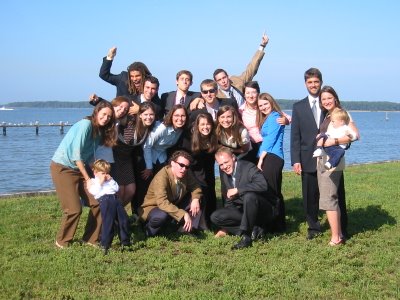Ain't it just like a friend of mine to hit me from behind
 Autumn came upon me today. With it came feelings of past autumns at Furman. I received a long letter from a friend who’s still there, and it drew my thoughts back to being in college. Last spring when my friends and I were dressed in caps and gowns, walking around smiling and taking pictures, many of us said that we thought graduation would "sink in sometime in the Fall.” I think today was the day. Today I realized I have graduated. It’s not a sad feeling, really, just a strong remembering. I remember where I have been the last four times Summer became Autumn, and I am conclusively aware that I am no longer there.
Autumn came upon me today. With it came feelings of past autumns at Furman. I received a long letter from a friend who’s still there, and it drew my thoughts back to being in college. Last spring when my friends and I were dressed in caps and gowns, walking around smiling and taking pictures, many of us said that we thought graduation would "sink in sometime in the Fall.” I think today was the day. Today I realized I have graduated. It’s not a sad feeling, really, just a strong remembering. I remember where I have been the last four times Summer became Autumn, and I am conclusively aware that I am no longer there.
That said, rather than feeling alienated or longing to return to places in my past, I think I am beginning to settle in here. I have not felt more comfortable or at home since my arrival in Maryland than I did today. This is probably due in part to the fact that we’ve been here 6 weeks and patterns are becoming established. But it is also due to the point we at the TFA have reached in our curriculum. We spent the first several weeks talking about how we approach and know God, highlighting two points: a) the limits of our reason/logic in understanding God and b) the importance of the fact that the Gospel is a narrative. That is, we know God first by the story he has told us of himself, not by a set of facts about him.
To follow and supplement this introduction to knowing God, we have entered a segment of life stories. We read Augustine’s Confessions as a model for how to tell a life story, and now each of the fellows gets an hour and thirty minutes to share his or her life with the group. This has been a monumental and wonderful endeavor. The task of trying to survey, comprehend, and narrate your entire life to others is daunting, yet it is so rewarding! Honestly confessing my life, my successes and failures, has been like rediscovering that I am free, like a reprieve from pretending. Of course, since my arrival here, it was always okay for me to be myself, but it was difficult to do so. (The new environment and unfamiliar faces have forced me to think a lot about what it really means to be myself). But telling my life story was like saying, “Okay, this is me, these are my issues; I am no more or less than this!” It was relieving and freeing to self-disclose.
Telling my life story was great, but better than that was hearing the stories of other fellows. I mentioned earlier “the point we at the TFA have reached in our curriculum,” and this is what I mean: Calvin said that knowledge of God and knowledge of humanity are dependent on each other. We cannot know God unless we know humans, and we cannot know ourselves if we do not know God. I have always given intellectual assent to this idea of Calvin’s, simply because it sounds true. But in sharing life stories we have tested Calvin's idea. We are attempting to understand God better by looking closely at one another.
And, lo and behold, I have realized that Calvin was right. In hearing these life stories, my view of God is being reinvigorated--I am seeing how God cares for and pursues people. I knew from my own life how I have treated God with bitter suspicion and distrust, only to have him love and heal me. And I knew how I have fought to be autonomous and self-righteous, only to have him humble and quiet me. But I have never heard stories in such intimate detail of other believers who have rebelled in different ways and yet found God’s love persistent. Some of us were born in shattered homes where chaos reigned, some of us were obssessive perfectionists clinging to our self-centered plans, some were born with everything we could ever want and yet somehow grew angry at the world. This week I have heard how God broke into the various and sundry defenses that my friends and I have constructed against him—how he has pursued people who run from him. It has given me personal and experiential insight into who God is and how he loves—knowledge that is not readily accessible in the academic study of theology.
The past week has made me wonder why I never sat my close friends down and made them tell me the stories of their lives. I have wondered at great length how to “foster community” and encourage intimate relationships between believers. One would think I might have stumbled upon this brilliant idea before: tell life stories!
Last week’s post was a bit abstract. I may have been thinking a bit too hard. Your comments have been invaluable to me, clarifying what is unclear in my brain. Thanks for helping me stay real. This post is a bit less academic, a bit more personal. I’m still trying to figure out how to blog. Oh, and the sunset is the view from our backyard a week or so agao. That is the Chesapeake bay in all its glorious colors.
 Autumn came upon me today. With it came feelings of past autumns at Furman. I received a long letter from a friend who’s still there, and it drew my thoughts back to being in college. Last spring when my friends and I were dressed in caps and gowns, walking around smiling and taking pictures, many of us said that we thought graduation would "sink in sometime in the Fall.” I think today was the day. Today I realized I have graduated. It’s not a sad feeling, really, just a strong remembering. I remember where I have been the last four times Summer became Autumn, and I am conclusively aware that I am no longer there.
Autumn came upon me today. With it came feelings of past autumns at Furman. I received a long letter from a friend who’s still there, and it drew my thoughts back to being in college. Last spring when my friends and I were dressed in caps and gowns, walking around smiling and taking pictures, many of us said that we thought graduation would "sink in sometime in the Fall.” I think today was the day. Today I realized I have graduated. It’s not a sad feeling, really, just a strong remembering. I remember where I have been the last four times Summer became Autumn, and I am conclusively aware that I am no longer there. That said, rather than feeling alienated or longing to return to places in my past, I think I am beginning to settle in here. I have not felt more comfortable or at home since my arrival in Maryland than I did today. This is probably due in part to the fact that we’ve been here 6 weeks and patterns are becoming established. But it is also due to the point we at the TFA have reached in our curriculum. We spent the first several weeks talking about how we approach and know God, highlighting two points: a) the limits of our reason/logic in understanding God and b) the importance of the fact that the Gospel is a narrative. That is, we know God first by the story he has told us of himself, not by a set of facts about him.
To follow and supplement this introduction to knowing God, we have entered a segment of life stories. We read Augustine’s Confessions as a model for how to tell a life story, and now each of the fellows gets an hour and thirty minutes to share his or her life with the group. This has been a monumental and wonderful endeavor. The task of trying to survey, comprehend, and narrate your entire life to others is daunting, yet it is so rewarding! Honestly confessing my life, my successes and failures, has been like rediscovering that I am free, like a reprieve from pretending. Of course, since my arrival here, it was always okay for me to be myself, but it was difficult to do so. (The new environment and unfamiliar faces have forced me to think a lot about what it really means to be myself). But telling my life story was like saying, “Okay, this is me, these are my issues; I am no more or less than this!” It was relieving and freeing to self-disclose.
Telling my life story was great, but better than that was hearing the stories of other fellows. I mentioned earlier “the point we at the TFA have reached in our curriculum,” and this is what I mean: Calvin said that knowledge of God and knowledge of humanity are dependent on each other. We cannot know God unless we know humans, and we cannot know ourselves if we do not know God. I have always given intellectual assent to this idea of Calvin’s, simply because it sounds true. But in sharing life stories we have tested Calvin's idea. We are attempting to understand God better by looking closely at one another.
And, lo and behold, I have realized that Calvin was right. In hearing these life stories, my view of God is being reinvigorated--I am seeing how God cares for and pursues people. I knew from my own life how I have treated God with bitter suspicion and distrust, only to have him love and heal me. And I knew how I have fought to be autonomous and self-righteous, only to have him humble and quiet me. But I have never heard stories in such intimate detail of other believers who have rebelled in different ways and yet found God’s love persistent. Some of us were born in shattered homes where chaos reigned, some of us were obssessive perfectionists clinging to our self-centered plans, some were born with everything we could ever want and yet somehow grew angry at the world. This week I have heard how God broke into the various and sundry defenses that my friends and I have constructed against him—how he has pursued people who run from him. It has given me personal and experiential insight into who God is and how he loves—knowledge that is not readily accessible in the academic study of theology.
The past week has made me wonder why I never sat my close friends down and made them tell me the stories of their lives. I have wondered at great length how to “foster community” and encourage intimate relationships between believers. One would think I might have stumbled upon this brilliant idea before: tell life stories!
Last week’s post was a bit abstract. I may have been thinking a bit too hard. Your comments have been invaluable to me, clarifying what is unclear in my brain. Thanks for helping me stay real. This post is a bit less academic, a bit more personal. I’m still trying to figure out how to blog. Oh, and the sunset is the view from our backyard a week or so agao. That is the Chesapeake bay in all its glorious colors.

